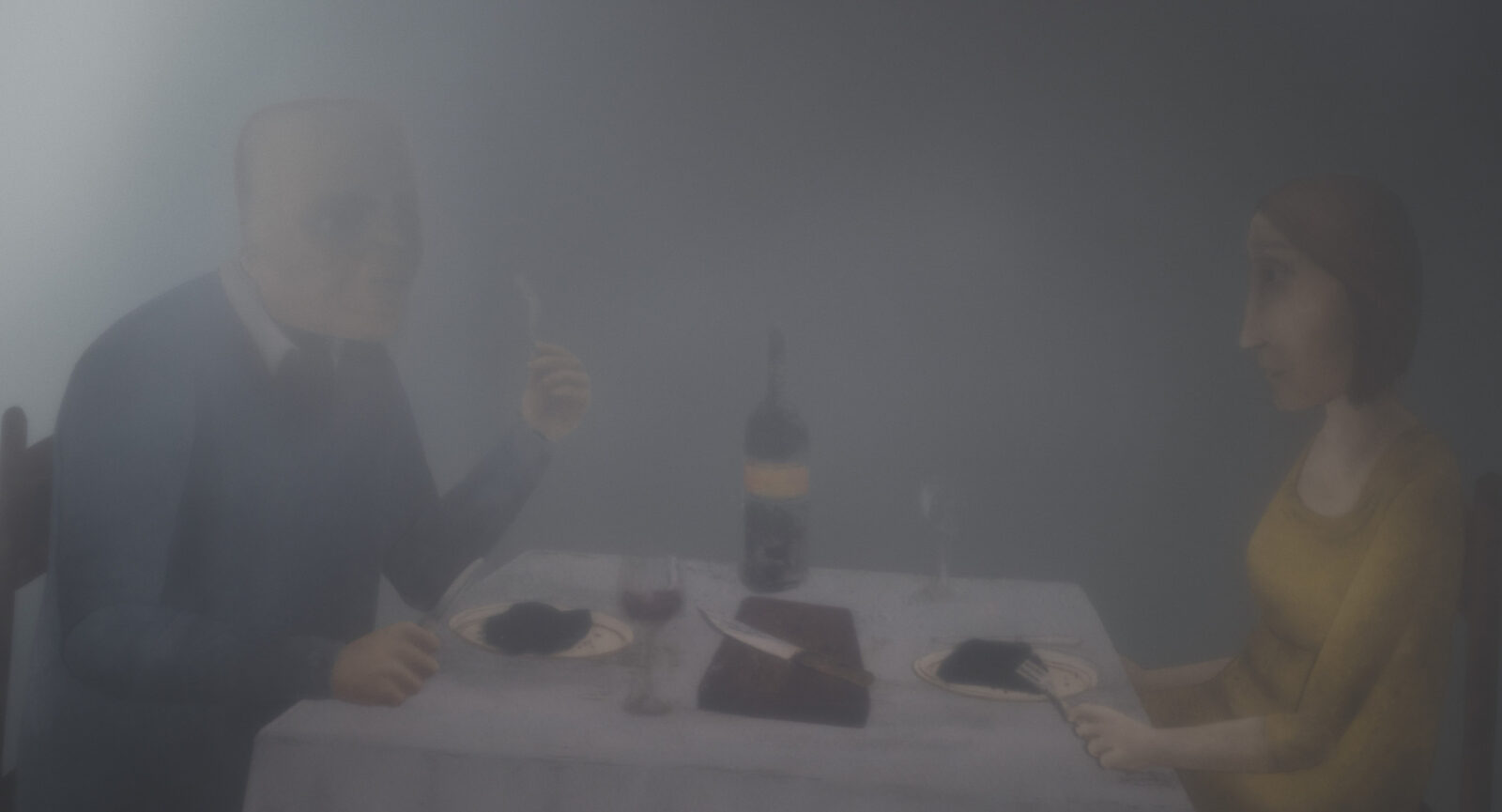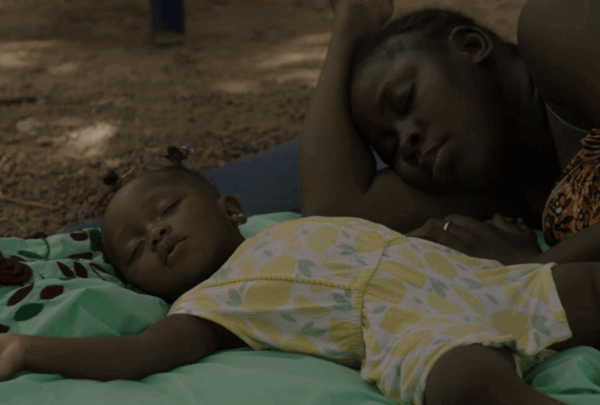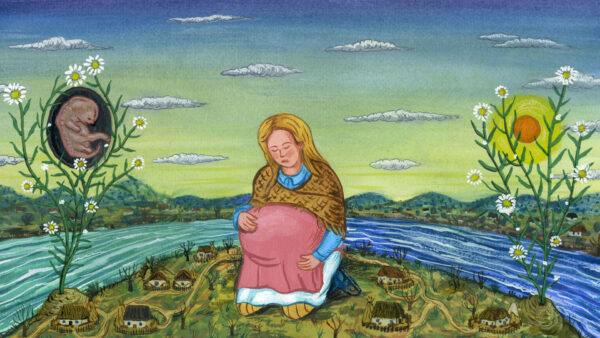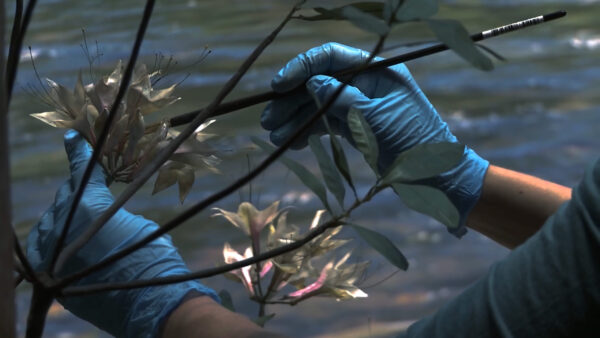Words And Meat
Steakhouse
This devious domestic animated drama from the acclaimed Špela Čadež seems enthusiastically committed to realist cinema.

The latest animated short from Nighthawk (2016) director Špela Čadež is a devious domestic drama. Steakhouse, screening at the Clermont-Ferrand International Short Film Festival, explores the tense relations between Liza and Franc, a middle-aged couple in Slovenia. We suspect all is not well between them. It’s Liza’s birthday and Franc cooks a steak for their dinner. With a stopwatch, he times the grilling of each side of meat and sprinkles helpings of salt and butter. Yet Liza is unaware of Franc’s time-sensitive dish waiting for her and is held up by birthday drinks with her colleagues. Back home, Franc’s steak begins to singe and burn as he waits for her arrival.
Čadež’s Nighthawk had a drink-driving badger as its protagonist. Steakhouse is her first film in over four years and marks a return to human characters, although what this couple is capable of is as ruthless as anything found in the animal kingdom. Franc is short-tempered and set on punishing Liza for coming home late. He lets their flat fill with smoke from the burning steak and waits angrily at the table. He’s a patriarch hidden behind his unassuming smile and quaint suburban home. The depiction of a doomed celebration calls back to Alison Snowden and David Fine’s 1993 animation Bob’s Birthday, but there’s something spikier to Čadež’s short. The film’s conclusion should be kept unsaid, but it delivers a cheerfully nasty sting. Perhaps a more accurate comparison is Suzie Templeton (Dog, 2001), the British animator whose films are filled with unhappy families on the edge of fracture. Like Templeton, Čadež is partial to devilish humor, which coaxes viewers out of their comfort zones.
Despite the film’s depiction of “psychological violence”, as the director has described it, its visual approach is soft and dreamlike. Liza and Franc’s world is blurred around the edges. The faces of other characters, like Liza’s colleagues, are unclear and confined to the sidelines. Earlier in the film, we could mistake the characters’ foggy surroundings as serene and calming, yet later start to suspect the soft edges of the frame are like walls closing in. When Liza enters her smoke-filled flat, she is submerged in darkness. The effect created by the camera of looking through a hazy atmosphere is impressively immersive. As the smoke begins to clear, Liza and Franc’s bodies appear like abstract shapes. Is that a hand reaching out? Or perhaps a face moving towards the camera? Franc seems to be the source of this visual disturbance.
The film’s approach to animation is utterly dedicated to the qualities of physical materials. Liza and Franc’s faces have the waxy texture of oil pastels while their bodies are flat like paper puppets. Although the approach is stylised, it’s very much grounded in reality. The intricate backgrounds of Liza’s office and the outside street place the story in a recognisable and uneventful world. Perhaps it’s this plausibility that leaves us unprepared for the surreal nature of the final scene, an ending that relocates the film into the realms of body horror.
This violent shift in direction is hinted at by the camera’s fascination with the sizzling flesh of Franc’s steak and the closeness of his hand to the grill’s boiling surface. Despite their picture-book exteriors, these are animated characters with tangible bodies. As Franc bites into his burned meal, we catch glimpses of his shining red gums. The art design recalls the cut-out characters of Yuri Norstein’s fairy-tale animations, most significantly of all his short Hedgehog in the Fog (1975), which places its characters in a similarly misty environment. Čadež’s film uses Norstein’s style and inverts it to depict a dark world far from the idyllic tales of the famed Russian animator.
Despite these historical links to animation history, it’s interesting to reflect on the film’s use of the medium. Like many of the animated films at Clermont-Ferrand, Steakhouse seems enthusiastically committed to realist cinema (aside from its brief lapses into horror). Perhaps this points to an emerging trend in animated film to fuse the qualities of the medium with the restrained performances and camera movements of certain live-action filmmakers. The ability of animated bodies to morph and transform is withheld in Čadež’s film, replaced with characters seemingly composed of flesh and blood. The fact that Franc is illustrated does not stop us from feeling the visceral nature of his fate. Would this violent conclusion be as stomach-churning if we hadn’t been convinced of the character’s normality or his separation from the cartoonish extremes possible in animation?
We can imagine that the characters of Liza and Franc would be handled differently if directed by figures of 70s European animation, especially those inclined to more surrealist approaches. But to criticise Čadež’s approach for its realist tendencies would be missing its true merits. There is a balance to the film which brings out the contradictory natures of its central couple. Just like the short’s homely picture-book qualities, Franc initially appears attentive and loving in his preparations for Lisa’s birthday. But as with its visual nods to realism, the violence of reality creeps into Liza’s flat. Čadež’s animation refuses to shield us from the darkness outside the cinema.





There are no comments yet, be the first!